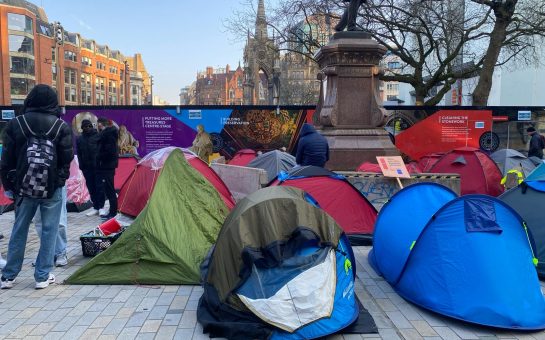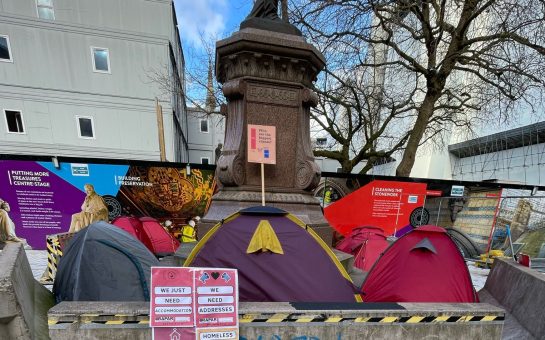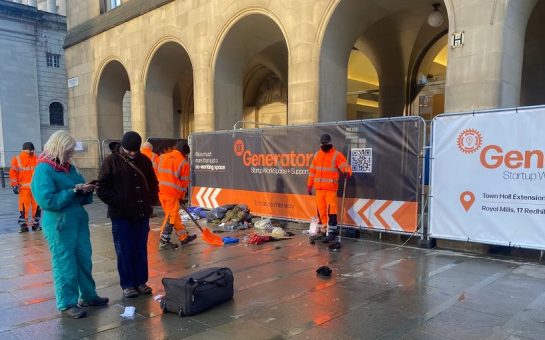After the death of more than 800 Libyan migrants last weekend while crossing the Mediterranean in the hope of finding refuge, we spoke to Manchester University professor Tanja Müller about Katie Hopkins’ controversial Sun column.
The sinking of Saturday’s migrant boat was the deadliest incident of its kind ever recorded in the Mediterranean, but far from the only tragedy like this to have happened in the last few years.
Since just the start of the 2015, 1,750 people have died, while just one week saw 10,000 migrants rescued from the seas between Italy and Libya.
Commenting on the growing number of tragedies of sinking boats in the Med, controversial Sun columnist Katie Hopkins wrote an article last Friday – just hours before the tragedy – about how she was unmoved by the plight of the refugees.
“No, I don’t care. Show me pictures of coffins, show me bodies floating in water, play violins and show me skinny people looking sad. I still don’t care,” she wrote.
“Make no mistake, these migrants are like cockroaches. They might look a bit ‘Bob Geldof’s Ethiopia circa 1984’, but they are built to survive a nuclear bomb. They are survivors.”

CONTROVERSIAL COLUMNIST: Katie Hopkins is known for being outspoken on touchy topics (© ITV, via YouTube, with thanks)
Dr Tanja Müller, Senior Lecturer in International Development at The University of Manchester, admitted that while Hopkins’ views shouldn’t be taken seriously, this time she crossed the line.
“I mean, what else is there to say. Calling people insects. I think one cannot really take her seriously but I am disappointed one of the major papers in a democratic country, even if it is a tabloid, allowed such a thing to be printed,” she told MM.
Reacting to claims that Hopkins represents the large proportion of the UK who have misconceptions about immigration, Dr Müller agreed.
She said: “I think the perception about numbers is totally wrong – there’s much fewer immigrants than people generally believe.
“There’s this presumption boats are heading for the UK, but also this presumption that people get it somewhere in Africa, this imagined continent, and plan to come to Europe.
“That’s not how it works. People leave their countries for valid reasons, then the next step is usually their neighbouring countries, and something happens there, they can’t stay there.
“At the end, after a long journey, they usually end up in a place like Libya, which has become more and more dangerous, particularly now the Islamic State are operating there and they have actually executed some Christian refugees in the last week.
“People are not suicidal, and they know the risks, they know there’s a high chance they could drown, but there’s just no other option.”
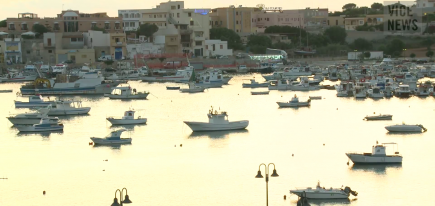
‘PEOPLE AREN’T SUICIDAL’: Dr Müller said the immigrants make the perilous journey knowing the risks (© Vice News, via YouTube, with thanks)
A petition started four days ago by an Eritrean refugee, urging the European Union to restore a ‘robust operation of search and rescue at sea’ has since attracted almost 350,000 signatures and a range of celebrity backers.
But Dr Müller wasn’t so convinced by the value of petitions like this in making real, measurable change.
“I think it’s very easy to do these campaigns on websites like Change. It becomes fashionable for a lot of people to participate in them, but whether it really changes the attitudes within the country, I’m doubtful,” she said.
“There was actually – maybe not a comparable, but an equally quite as impressive reaction – after Lampedusa in 2013.
“But that also disappeared very quickly again afterwards. So I’m always a bit wary of these social media campaigns as they just come and go.”
Speaking about how the public regard the issue of immigration in the UK, Dr Müller said that the immediate attention always goes to the humanitarian issue.
She added: “Obviously the humanitarian issue is caused by a deliberately-created EU migration and asylum policy and it’s actually much more than the humanitarian issue.
“Of course, one response – one with some sort of normal humanitarian conscience would think – would be to rescue people at sea, but that wouldn’t stop the problem.
“When Mare Nostrum was still on, more than 80% of the people who were rescued had a legitimate asylum case, but they would have never been able to make that case.
“That’s because they would never have reached the European country legally without paying people smugglers and going on those boats to launch their case.
“So the problem, actually, is not humanitarian, but the humanitarian issue is just a consequence of a much wider political problem.”
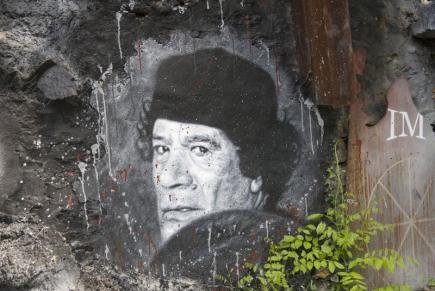
‘LIBYA WORSE NOW THAN WHEN GADDAFI WAS IN POWER’: The UK’s involvement in Libya has destabilised the country and contributed towards the immigration situation
(© Thierry Ehrmann, with thanks)
The Manchester University lecturer spoke about how a large part of the problem was political, and explained her frustration with the UK military approach towards Libya.
“Libya, of course, is part of the problem caused by UK military forces. Gaddafi might have been an unpleasant person, but I think the state Libya is in now is much worse than when he was in power, and it was countries like the UK that helped to make it like this,” she said.
At 11am this morning in Piccadilly Gardens, Paul Davies, Communist League candidate for Manchester Central, held a rally calling for the borders of the UK and EU to be opened to those fleeing devastation in Africa and the Middle East.
Referring to his party’s pleas to the government to show humanity, Mr Davies said: “With nearly 2,000 drowned since the start of the year there is only one answer that can both provide a safe haven and end the succession of deaths at sea – opening the borders.
“Thousands are fleeing because of the never ending wars and the impact of imperialist exploitation, they are driven to these desperate moves to seek a better life in Europe.”
Dr Müller agreed that there needs to be an element of being more accepting towards the ideas of accepting more refugees, explaining that their use to our economy is not to be undervalued.
She said: “First of all, we need to establish that asylum seekers are people who will probably be people who are recognised as refugees if they have the right to launch an application.
“A lot of election campaigns in the UK now place this stress on a need for ‘skilled migrants’, but actually when you look at it, when you talk to some farmer in Norfolk, a lot of people actually also need unskilled labour a few months a year.”
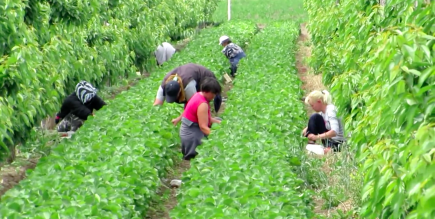
‘UNSKILLED LABOUR IS NEEDED’: Dr Müller proposed an arrangement where immigrants could work for a set number of months per year (© Michal Privizer, via YouTube, with thanks)
She suggested an arrangement whereby immigration would be tightly controlled so that for a set period of time, such as three years, a refugee would be able to come here for four months a year and work as an unskilled labourer.
“People would take that opportunity. It would be much cheaper for them to pay for their flight, earn the money, and go back home in the knowledge they can come back here next year to work for a few months,” she added.
“It’s just a myth that they are unskilled people who take jobs from others. These are jobs that actually a lot of people have no interest in doing.
“So we need to have a proper acknowledgement that there is also a labour market – not only for skilled labour, but also for unskilled labour.”
The lecturer thinks adopting a Europe-wide policy on dividing up refugees based on member states’ wealth and population size is the fairest way to begin to tackle the problem of immigration, adding that each country needs to commit to accepting a certain number.
She said: “At the moment, there are some countries that say ‘we’ve admitted 200 Syrians and it feels great’, but that’s bollocks, really.
“I think you need to have a very proper, measured way of saying, ‘ok, we as the European community, we share responsibility for these things’.
“We can’t leave it to Italy or Greece or some of the other countries where people land, but instead have a proper system where people are divided based on population size and wealth of each country and agree on that.
“I’m not sure whether this is ever going to happen, but that would be an enlightened way forward.”
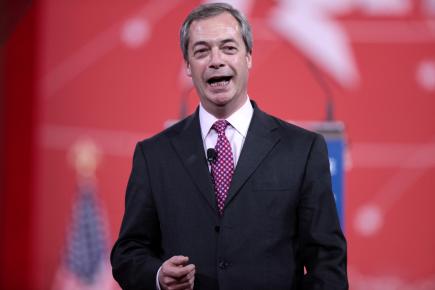
‘USED AS POLITICAL TOOL’: All the UK parties have continued to use last weekend’s tragedy as a tool in their election campaign
(© Gage Skidmore, with thanks)
MM asked whether the tragic incidents of last weekend have been used as a political tool in the election campaign in the run-up to the vote.
“I mean, obviously it’s used by all parties to enforce what they’ve always said,” responded Dr Müller.
“Nigel Farage has always said we should approach immigration like Australia, stop the boats and send people back, and it’s a little like what David Cameron says too, in not-so-clear words.
“For me, the main messages I’ve seen by politicians in the UK have been for militarisation; to destroy the smugglers’ boats, catch the smugglers, etc etc.
“But if there’s a market, there will always be people who will provide for that market – after all, that’s capitalism. What I would have liked is some leadership by politicians to say, ‘right, what are the core values of a civilised society?’
“If people are dying in front of our eyes by a policy that does something to makes them die, then there’s something wrong. But nobody really defends migrants or refugees in that way.
“And this makes us silent accomplices of what might one day be called the greatest premeditated murder in the post-second-world-war-world by future historians.”
Image courtesy of A. Rodriguez, UNHCR, with thanks.

